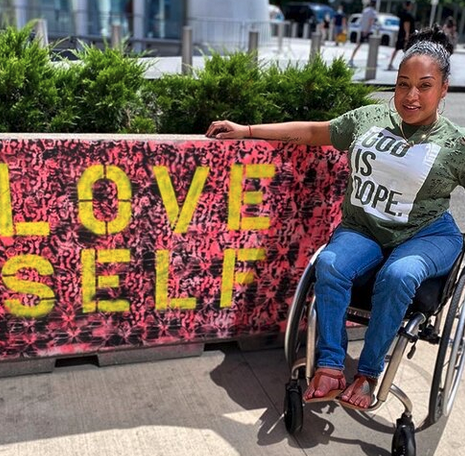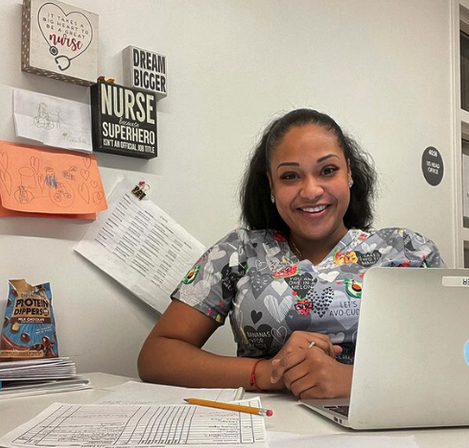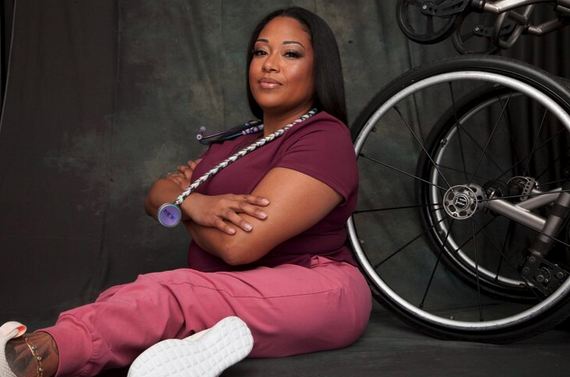Andrea Dalzell was diagnosed with transverse myelitis when she was five, leading her to use a wheelchair full-time by age 12. 
Inspired by her experiences with nurses, she received her nursing degree from the City University of New York, College of Staten Island. Andrea is the first registered nurse in a wheelchair in the state of New York.
As an advocate and activist, she has won national recognition over the years, including being named New Mobility’s Person of the Year (2021) and the inaugural Craig H. Neilsen Visionary Prize award 2020.
Andrea is giving the morning keynote at the ANA-Illinois 2021 Virtual Professional Issues Conference. She responded to questions over email; responses have been very lightly edited.
Breaking Down Barriers to Disability Inclusion in Nursing
Can you tell me about your current position?
How many hats can one person wear? I once went through 76 clinical nursing interviews. I was rejected from them all until COVID demanded my help during the peak in NYC. The rejection from ever having a bedside nursing position was flipped on its head as my wheelchair was seen for what it is: a mobility device. I was always able to get a nursing administration job, but other nurses that were the gatekeepers of clinical practice saw me as a hindrance or saw the chair equivalent of incapable. Some nurses even believe my disability and use of a wheelchair increased infection risk. This is a huge misconception, and as an evidence-based practice, we must never make those kinds of assumptions.
When we consider the profession of nursing, I wanted to show how our care and compassion at our most vulnerable times encompassed with technology, leads to amazing outcomes.

I am currently a nurse consult for a private school along with being the assistant nurse manager for a primary care practice. I have a combined hands-on clinical experience with administrative work. I have given 7 nurses fresh out of school their start in the profession and shown them that those with disabilities are just as capable. My mere presence in a clinical setting, allows patients to see themselves in a different light.
What message do you have to non-seated nurses and administrators about how to create an inclusive workplace?
Understand at the bare minimum, all anyone ever wants is a chance. A chance to prove that they can do something. Disability is often seen as a lower quality of life measure. Cultural competence needs to include disability etiquette. Just because someone has a disability, don’t assume they need help. If the setting is accessible, people with disabilities can typically get around fine.
Adults with disabilities want to be treated as independent people. Offer assistance only if the person appears to need it. A person with a disability will oftentimes communicate when they need help. And if they do want help, ask how before you act.
Disability is everywhere; we put out the equal opportunity statements and a mission of great quality health care while missing the core of innovation that allows opportunity for those we’ve cared for.
Creating More Diverse & Inclusive Nursing Environments
What do you want others with disabilities who dream of nursing to know?
It is possible! Don’t let someone tell you otherwise. It takes an open mind and perseverance. Nursing schools and clinical sites are charting new territories. What was once a taboo to be spoken about, disability (visible or invisible) is being spoken about now. The National Organization of Nurses with Disabilities is a great place to start with questions. Every person’s disability is different, and nothing is known at the beginning. Understand that an open line of communication is necessary.
What’s your vision for the future of nursing? And how do we get there?
My vision may be a dream. Nurses of the past could never have dreamed of the nursing profession we have today, so maybe my dream will be surpassed. I would love to see true inclusion in nursing. I want to see the standards of nursing practice really include advocacy for those with physical, cognitive, and intellectual disabilities. We work with cultural competency because that brings awareness. We need to have a fundamental understanding that what we once deemed a death sentence is now a thriving community that anyone can join at any time. Disability is the fastest- and largest-growing minority in the world. Without disability inclusion, you could very well be limiting opportunities for your future selves.
You recently started The Seated Position 501c3 nonprofit. What are some of your dreams and goals for this nonprofit?

The Seated Position was created to create awareness around those with disabilities in education and the workforce.
I wanted a space that students in higher education can access advocacy and those in the workforce could understand what workplace accommodations look like. Accommodations and advocacy are not taught, and—although we may have student accessibility services or Human Resources—these are not resources made to address disability in the professional world.
Appreciating Nurses’ Strength & Value Every Day
Your warrior spirit has been forged in fire—and you’ve worked the frontlines of the pandemic. What can you tell other nurses battling in the pandemic about how to tap into their strength in the midst of intense challenges?
To all the nurses that have been on the frontline of COVID since day 1, THANK YOU! I know right now thank you’s are hard to hear (or read) since we are not out of the woods yet. Your strength has already been shown, and I cannot ask you to tap for more.
I will ask that you understand your value as the person who held the hands of those taking their last breath. Your power as a nurse was never more appreciated than in those hard moments. You made a difference. The hope and courage you’ve had despite what you have faced is strength no one can ever recreate.
Through this challenge, I see your heart beating with passion to fight until we beat this pandemic. You have what it takes! I truly give my heart to all the nurses out there who have played a role throughout what seems to be an endless journey. You are seen and so appreciated!
* * *
Register for the ANA-Illinois 2021 Virtual Professional Issues Conference to hear directly from Andrea about how to create a more inclusive nursing profession.
